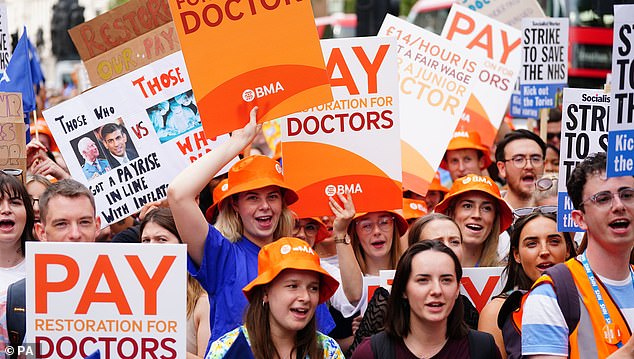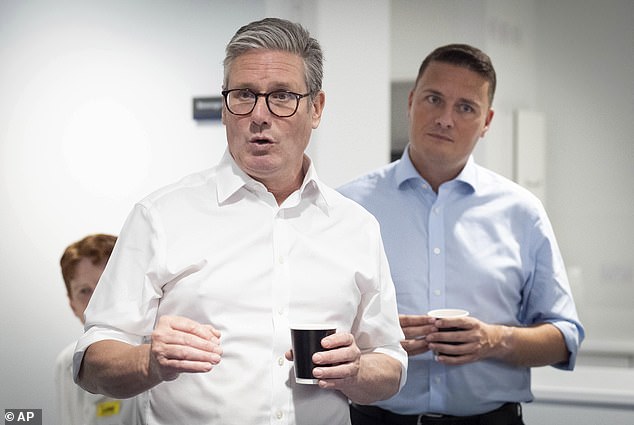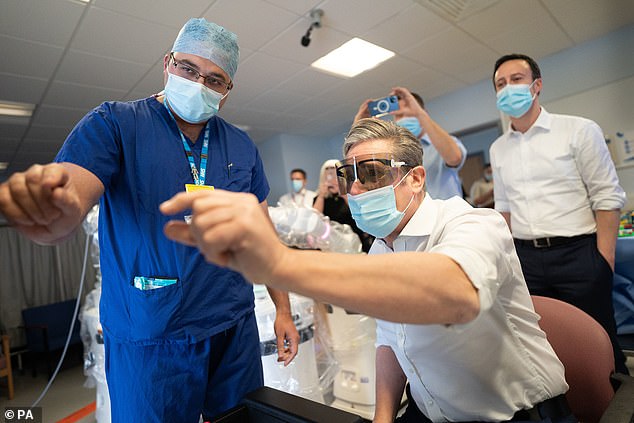The battle lines have been drawn. We know who the combatants are in the latest pay row in the NHS – the doctors and the Government. And, sadly, we know who the casualties will be – the patients.
Junior doctors – whose extraordinary self-regard is evidenced in their new insistence on being called ‘resident’ doctors – have announced they will abandon their duties for five days at the end of this month in support of a staggering 29 per cent pay demand. That’s on top of a 22 per cent increase over two years already given to them last year.
It’s an increase that no other public or private sector group of workers would even dare demand. But doctors, egged on by their ultra-Left union leaders at the British Medical Association (BMA), are convinced they are a special case with a special cause. These aristocrats of the public sector are entitled to far more consideration than anyone else. They are more hardworking, more conscientious, more virtuous – simply better than you and me.
While every other worker in the country must settle for low single digit percentage pay rises, resident doctors are demanding a rise that represents nearly a third of what they already earn.
Does it matter that the cost of such an award would have to be paid by workers earning far less? Well, let them eat cake!
And if doctors don’t get what they ask for, they will make us all suffer.
Urged on by their trade union, resident doctors will abandon their patients in order to stand on picket lines instead. Cancer patients, heart attack victims, those desperately in need of intensive care – they must all take second place to the residents’ pay demands.
In recent years the BMA has metamorphosed from a trade union representing its members’ interests to a hard-Left cliche that bangs on more about Palestine and trans rights than the working conditions of its members.

We know who the combatants are in the latest pay row in the NHS – the doctors and the Government, writes Tom Harris. And, sadly, patients will be the casualties
When doctors are standing on the picket lines outside their places of work, eagerly expecting – and often receiving – the support of members of the public lucky enough not to depend on doctors’ services right at this moment, don’t be surprised to see a number of Palestinian flags and trans pride flags among the placards demanding ‘fair’ pay.
Those flags serve as a reminder of just how out of touch and irrelevant the BMA’s agenda is to ordinary voters.
And yet for some reason the public refuses to see resident doctors for what they are: they’re not saints in white coats or martyrs to the glory of state-run health care, they’re ordinary men and women who, just like the rest of us, want more cash in their pockets.
Where they are different, though, is that in order to get it they are prepared to cause untold harm and distress to those who depend on them for expert care.
If resident doctors are going to behave like any other group of workers in demand of pay rises – dock workers, lorry drivers, teachers, train drivers – then they must be treated and negotiated with in exactly the same way. The esteem and prestige the public attach to their jobs must be jettisoned. Saints don’t sacrifice their patients for extra cash.
What is so infuriating is that we all saw this coming. Why didn’t the Government?

Sir Keir Starmer and Health Secretary Wes Streeting visit University College London Hospital
That staggering 22 per cent increase over two years that Sir Keir Starmer handed resident doctors last year was one of his first acts on taking office a year ago. The aim was to stuff the residents’ mouths with gold in an attempt to bring to an end the doctors’ strikes that had plagued the last few months of the last Conservative government.
Did Labour really think that would end the residents’ grievances? Shouldn’t Sir Keir have worked out that offering such a large award – an award that didn’t even include a demand for a reform of out-of-date work place practices – would only encourage them to come back for more?
And that’s what they’ve done.
These pampered medics claim their take-home pay has been devalued since the financial crash in 2008. But so has almost everyone else’s. And other hard-pressed public sector workers weren’t placated with the kind of pay award that was given to residents last year.

Doctors, egged on by their ultra-Left union leaders at the British Medical Association, are convinced they are a special case with a special cause, comments Tom Harris. Pictured, the Prime Minister gets involved with surgical robot tech at Lister Hospital in Stevenage
What’s more, the pay demand comes in the very week that the Office For Budget Responsibility issued the most dire warnings about the public finances, which it says are ‘in an unsustainable position’. In such circumstances the greed of the resident doctors is grotesque.
The BMA, like everyone else in the country, knows by now that Sir Keir constantly U-turns and that he usually gives in eventually.
Meanwhile, we have a cohort of Labour ministers brought up on the mother’s milk of NHS worship, and who believe instinctively that not paying resident doctors whatever they want is a betrayal of Nye Bevan’s founding vision.
No wonder they’ve been a pushover for the militant BMA leadership so far.
Equally ready to bend the ear of the Health Secretary are his parliamentary colleagues, the 300 Labour back benchers – many of them funded by the unions – who naturally sympathise with the strikes and will happily undermine their own government if doing so makes them feel more virtuous.
It was hoped by some that Sir Keir’s 174-seat majority landslide would allow his government to carry out almost any policy it wished.
But after a series of humiliating reversals on the Winter Fuel Payment and, most recently, the collapse of the Government’s welfare reforms, that phalanx of restive Labour MPs is proving an impregnable obstacle to the Prime Minister’s attempts to govern.
Did no one warn this army of young legislators that governing is harder than it looks from the opposition benches? That it frequently involves standing up to vested interests – yes, even in the NHS.
Did no one bother to tell them that governing sometimes means doing the right thing, even if it’s unpopular to some?
This latest clash, one that threatens the very future of the NHS, could define this government’s mission and show voters who’s really in charge of the country. But I fear my former party yet again hasn’t the stomach to resist the doctors’ latest cash grab.
Tom Harris is a former Labour MP











